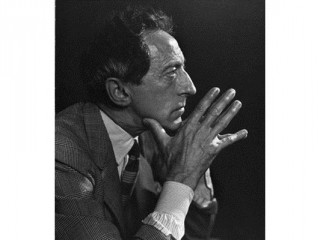
Jean Cocteau biography
Date of birth : 1889-07-05
Date of death : 1963-10-11
Birthplace : Paris, France
Nationality : French
Category : Famous Figures
Last modified : 2011-07-20
Credited as : Poet and novelist, dramatist, boxing manager
Jean Cocteau was born in a suburb of Paris and brought up in a well-to-do home frequented by the artistic notables of the day. As a schoolboy at the Lycee Condorcet, he was anything but a model pupil, but he charmed his teachers by his verve and brilliance. His official debut was at the age of 18, when the renowned actor Edouard de Max gave a lecture on Cocteau's poetry. Cocteau soon visited Edmond de Rostand, Anna de Noailles, and Marcel Proust; everybody and everything fashionable attracted him.
When the Russian ballet performed in Paris, Jean Cocteau was there. Soon he proposed to its director, Sergei Diaghilev, a ballet of his own. The resulting Blue God, which was not presented until 1912, was not a success. Not daunted, Cocteau started the ballet David, for which he hoped Igor Stravinsky would do the music. Although the ballet did not materialize, Potomak, a curious prose work of fantasy dedicated to Stravinsky, did get written, and texts composed for both works were finally incorporated in a ballet called Parade. Erik Satie and Pablo Picasso collaborated with Cocteau on this production, for which Guillaume Apollinaire, in a program note, coined the word surrealistic.
After World War I, when Dada and surrealism replaced cubism and the "new spirit," Cocteau played about with the new ideas and techniques without adhering strictly to any group. The mime dramas of The Newlyweds of the Eiffel Tower and The Ox on the Roof as well as the poems of The Cape of Good Hope all demonstrate the manner of the day without, however, following any prescribed formula. Subsequently, in verse Cocteau reverted to more conventional prosody, and in fiction, to an uncomplicated narrative style. The Big Split and Thomas the Impostor present in forthright prose the themes of the author's life and times.
Antigone opened Cocteau's series of neoclassic plays, which enjoyed great success from the late 1920s on with their sophisticated props such as oracular horses, symbolic masks and mirrors, angels, and mannequins. The same trappings would be maintained for his plays of romantic or medieval inspiration and would constitute, as well, recognizable features of Cocteau's films.
In the universe that Cocteau's work evokes, the boundaries between what is real and what is unreal disappear, and none of the conventional oppositions such as life and death or good and bad remains fixed. Enveloping the work is a hallucinatory atmosphere that is characteristic. Cocteau was elected to the French Academy in 1955.
















